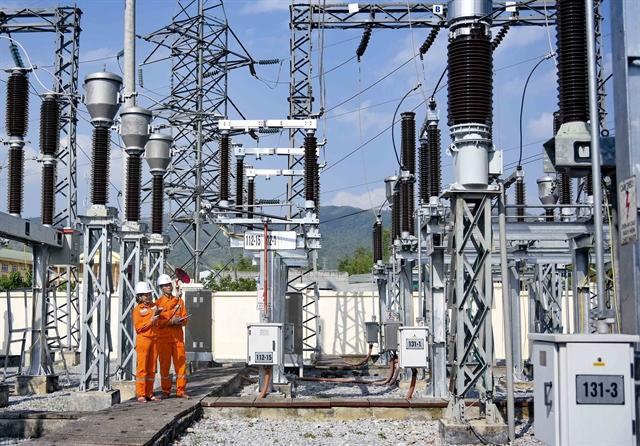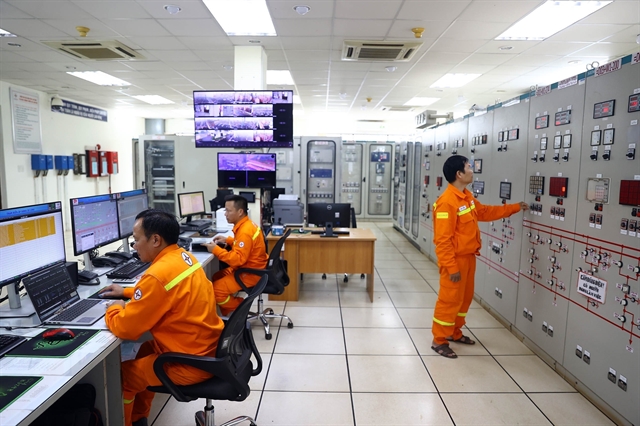 Business Beat
Business Beat

 |
| The centre operating EVN's 500kV line in Lâm Đồng Province. On October 11 the average electricity retail price has been increased by 4.8 per cent to VNĐ2,103.1159 (US$0.085) per kWh. — VNA/VNS Photo Huy Hùng |
HÀ NỘI — The average electricity retail price has been increased by 4.8 per cent to VNĐ2,103.11 (US$0.085) per kWh on October 11, triggering worries about its impact on commercial and residential customers.
The recent increase means electricity prices are more than 12 per cent higher than two years ago. On May 4,2023 the electricity price was increased by around three per cent and there was another increase of 4.5 per cent on November 9, 2023.
The Việt Nam Electricity (EVN)’s decision to increase electricity retail prices came just days after the Ministry of Industry and Trade announced the inspection result which found that EVN incurred a loss of more than VNĐ21 trillion (US$485 million) last year, on rising electricity generation costs.
Following the increase in electricity retail price, the Ministry of Industry and Trade has announced the retail electricity tariff. Accordingly, there are six rates for retail electricity tariff for residential use. Rate 1 is for the kWh from 0-50 at VNĐ1,893 and rate 3 is for the kWh from 401 kWh onwards at VNĐ3,302 per kWh.
According to EVN, the increase in electricity prices will have different impacts on different groups of customers, depending on the usage levels and behaviours. Poor households will not be affected much by the increase.
Within business, there are around 547,000 customers with an average monthly spend of VNĐ5.17 million for electricity bills. After the increase, each will have to pay an additional sum of around VNĐ247,000.
For manufacturing industry, there are 1.912 million customers with average monthly spending of VNĐ10.38 million for electricity who are estimated to pay an additional amount of around VNĐ499,000 per month. This is the group of customers which will bear the largest impact from this electricity price increase.
Regarding the customer group of residential use, there are 17.41 million households which use 200kWh or less per month, accounting for 61.35 per cent of the total number of households. These households will, it is estimated, pay an additional VNĐ13,000 per month for electricity after the increase.
Thus, the impact of the electricity price increase on customers of residential use is moderate. Those who use more will have to pay more. EVN also pointed out that there are grounds for increasing electricity prices.
The increase is compliant with the Politburo’s Resolution No 55-NQ/TW dated on February 11, 2020 on Việt Nam’s national energy development strategy to 2030 which said that market-based mechanism should be applied for every kind of energy. The increase is also in compliance with the Prime Minister’s Decision No 05/2024/QĐ-TTg dated on March 26, 2024, on mechanisms for adjusting average electricity price.
Electricity prices are increased on rising input costs, including coal, gas and oil prices as well as exchange rates.
Nguyễn Xuân Nam, EVN’s deputy director, said that EVN decided the increase at 4.8 per cent to try to ensure social security, as well as limit the impact on lives and the economy.
Trần Việt Hoà, Director of the ministry’s Electricity Regulatory Authority of Việt Nam, said that EVN incurred significant losses in 2022-23 which might affect electricity supply and energy security. Increasing electricity prices was necessary.
Director of Hiệp Phát Mechatronics Limited Company, Bùi Thanh Luân, said that electricity price accounted for up to 30 per cent of the production cost. The increase in electricity price would push up production costs by around 3-5 per cent, a burden for them in the context of struggling market.
Luân said that his company was trying to arrange working time to reduce electricity usage during peak hours, while replacing machineries to save energy.
Nguyễn Đức Thắng who is director of a garment company, said that prices of other inputs also increased along with the increase in electricity price. He estimated that production costs had increased by around 10 per cent so far this year, reducing the competitiveness of products.
Manufacturers must seek ways to reduce production costs, including arranging working times and saving energy, Thắng said, adding that he was considering installing roof-top solar power.
Need for reform of electricity pricing
The electricity retail price being lower than the electricity production cost is a problem not just for the industry itself but for the entire economy, Nguyễn Tiến Thoả, former Director of the Price Management Department under the Ministry of Finance said, citing statistics that the cost of electricity production is VNĐ2,088 per kWh, while the average retail price was at VNĐ1,953 per kWh (before the latest increase).
"It is important that the retail price can make up for the cost to attract investments in developing electricity generation sources," Thoả said.
The Government should regulate electricity prices through market tools such as taxes and fees as well as funds to have reasonable electricity tariffs to harmonise benefits of relevant parties, he added. Electricity prices should be separated from support for social security to ensure transparency, Thoả said.
Thoả said that pricing principle must ensure that production costs are covered, calculated correctly, sufficiently and reasonably.
Director of the Centre for Energy and Green Growth Research, Hà Đăng Sơn, said that if the electricity prices continued to be subsidised, EVN would not have enough resources to invest in large-scale projects, causing difficulties in implementing the power development plan.
Sơn said low electricity prices would make the electricity industry unattractive to investment and discourage enterprises from using energy with efficiency and renovating technologies.
Việt Nam had developed a roadmap for comprehensively reforming the electricity industry towards net zero and sustainable development, Sơn said, emphasising that the first priority must be on reforming the electricity pricing to encourage energy transition in power generation structure.
The electricity prices should be market-based while EVN should play its role in ensuring adequate supply of electricity, Sơn stressed.
“If we do not invest in new power sources in time, it will be difficult to meet the demand for production and daily lives, which will affect not only quality of lives but also production and the investment environment,” Deputy Director of the Electricity Regulatory Authority of Việt Nam Nguyễn Thế Hữu said.
The fact was that the electricity price had not kept pace with the electricity production cost, causing the electricity industry not to have resources for investment and development, he said: “We must find a way to make the electricity price closely reflect the production cost.”
In any case, the top priority should be ensuring the harmonisation of benefits between the Government, consumers and producers and other social security issues.
“It is necessary to develop a roadmap to make electricity prices reasonable and able to cover costs to ensure sustainable development of the electricity industry,” he emphasised. — VNS




